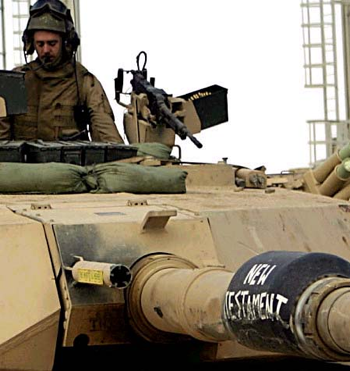Monday - May 22, 2006
 Irony
Irony
The radios weren't lost, we knew exactly where
they were and they were in US custody, but there was still a lot of paperwork to
declare them lost and then somehow find replacments. They weren't lost, they
may even have worked, there was no way to know. The problem is that they were
now radioactive. As was the rest of the
tank.When you're near a tank, you know
it. They are big. They are loud. They look dangerous. They are dangerous.
To others.The enemy fears tanks.
Infantry love tanks. Having a tank along makes the enemy go away. Our aviators
hated tanks because they make the enemy go away, the aviators don't like targets
to go away. Aviators have their own iron to drop on the
enemy.It's ironic that the most
dangerous weapon on the battlefield is the safest place to be. Inside the iron
tank, the crew are safe. Tankers are fearless, nothing will hurt them, unless
they get out of the tank.

A double or triple stacked anti-tank mine, with a
few artillery shells lay waiting for who knows how long. It was the dust storm
season, the sand had a consistency of talcum powder, we called it "moon dust."
Foot steps and vehicle tracks tended to be obscured by the strong winds. Most
objects, including mines and artillery shells were invisible.
The tank crew didn't see the bombs and
rolled right over them.
US tanks are
brilliant designs, they may not be invulnerable but the crew almost always
survives.
The crew got out safely.
They had their bells rung, but they were generally fine. The other tank crew
called on the radio for help and stood guard while they watched the breached
tank hull cook off its ammo and melt.
The iron melted, but the crew was
safe.
Help came, the mobile action
platoon came to carry the tankers home. They must have felt great relief at
this deliverance from the hell they just survived. The sun had set, Marines own
the night, they were safe. Just a quick ride home, and then they would tell the
story to all their friends of how they survived the
bomb.
A mobile action platoon has four
vehicles, one is typically a "high back" with an open cargo bay and thin armored
sides. The tankers and some of the MAP crew climbed into the high back.
Usually the high back is the third truck when they travel. Somehow the first
two trucks missed it. The high back
didn't.
And that's the irony. The
tankers survived a bomb that melted their tank, only to hit another bomb just as
big on their way home.
Three tankers
and two infantrymen from the MAP were
killed.
This time a section of amtracs
were sent to recover the crews. They finally arrived at the dam safe. As safe
as the dead can be.
As the night
dragged on, the bodies were loaded onto helos, the amtracs were hosed out. The
ground was hosed off. Weapons were accounted for. Personal gear
inventoried.
The night dragged on, I
was the last officer to stay up. The guys from the tank platoon did all the
work. The anguish on their faces was painful to watch. This was one of those
times they don't train us for. Leaders need an instinct for knowing what to do.
What is the right thing to do? I was torn between staying and providing an
officer's presence, or leaving them to their own grief, to sort out their
emotions without an outsider watching, intruding on their tight family.
I left about 2am, I don't know how
late they stayed up. The weapons and other controlled gear were all accounted
for. The bodies were sent to Al Asad. Everything was picked up and orderly.
I'll always wonder if I did the right
thing to leave. There's no way to answer that question. I mentioned to someone
there that I was leaving. I don't know if he cared.
The melted tank was moved the next
day. They sent out a tank retriever and a heavy equipment transport to get it.
Last I saw it, it was still sitting by itself in a field in Al Asad because the
radiation from the melted components made it too dangerous to be
near.
Al Asad is where we send dead
people and dead tanks. Iron tanks, iron men.
Go Back to the Start, Do Not Collect $200 Send me your two cents
|
